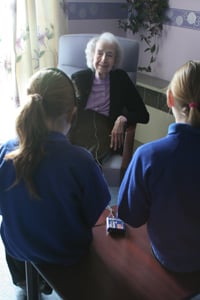One of a kind
Tom Andrews explains how an arts programme celebrating kindness has made a difference to the way primary schoolchildren feel and act towards other people

People United is an arts organisation and creative laboratory, which exists to explore how the arts can inspire kindness, community and social change. We wanted to see whether it was possible for the arts to inspire children to care more; not only about their peers, but for people to whom they had no previous connection.
With the Centre for the Study of Group Processes at the University of Kent, we launched a new project: We All Do Good Things. Based on academic research (and gut instinct) we focused on areas that have been found to encourage kindness; for example, increased awareness of everyday positive actions and a sense of connection to others.
With professional arts practitioners, we put our theories into practice at three primary schools, two in Kent and one in Halifax, over the course of a school year. The artists were given time and freedom to develop their own ideas, but the overall aim was shared. Activities ranged from workshops with the then Poet Laureate Andrew Motion to South African gum-boot dancing. And pupils were encouraged to document acts of kindness in creative ways, from drawing comic strips to devising performances.
Parents and the local community were integral; attending events, writing their own stories of kindness and being involved in projects. Pupils from one school interviewed residents of a local care home and produced a special magazine. Those from another made kindness badges for local shoppers and get-well-soon cards for local hospital patients.
We were aware that an organisation focused on kindness, compassion and ethical values could be perceived as ‘wishy-washy’ and idealistic. In order to demonstrate that our ambitions could be pursued with rigour and professionalism, a team from the universities of Kent and Leeds designed a carefully controlled evaluation study to measure the project’s impact. Every child from years one, three and five was interviewed before, during and after the project. They were asked about their willingness to care for, share with and help other individuals (pro-social attitudes) and their feelings about members of other groups. The researchers compared their answers with those of children in two similar schools that did not take part in the project (control schools). Qualitative researchers from Canterbury Christ Church University evaluated the impact on teachers, parents and the wider community; the evaluation included over 1,200 structured interviews.
Research by the University of Kent found that, after taking part in the project, children were significantly more willing to care for and help members of their community and felt more positive about other groups. And the attitude endured – as proven by interviews carried out five months after the project ended.
Since the schools project, we have developed the We All Do Good Things programme online and through a long-term project across a whole town. This has had exciting results, but that’s another story.
Join the Discussion
You must be logged in to post a comment.